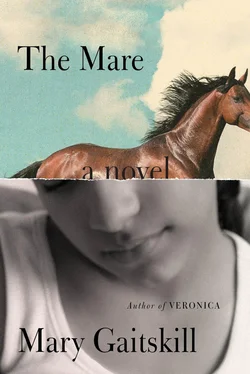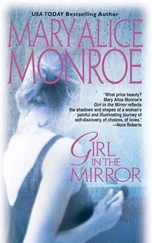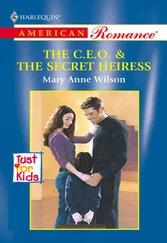“What?”
“I’m not gonna yell anymore, not even when I’m mad.”
“There’s nothing wrong with yelling when you’re mad. You’re a fiery girl,” I said.
“What does that mean?”
“That you’re intense, you have strong feelings.”
She didn’t say anything, and I began to worry that I’d insulted her somehow. Then she said, “I just decided something else. From now on, I’m going to call my mare Fiery Girl.”
When we hung up, there was a smile in her voice.
I didn’t speak about it to Paul. But when we got in bed, I turned with my back to him and curled into a ball. I thought over and over of Velvet, of holding her like I said I would, brushing her hair, singing to her. I thought of the way she said “My mare,” like “mah mare” or “ma mère”—my mother in French.
I went to bed that night not even wanting to touch my mom because she threw my horseshoe out the window and started screaming when Ginger called. But I fell asleep and then I woke up and she wasn’t there and I was scared. Instead of her, Dante was holding a pillow put sideways, like somebody took my mom and put the pillow there to fool him. I hoped she was just in the bathroom, but I knew she wasn’t and I was right. I got out of bed and went to look for her. When I got to the kitchen, I thought she’d gone away and left us. I opened the window — I don’t know why, maybe to call for help — and I looked down and saw she was standing on the sidewalk with her hoodie on over her nightgown. It didn’t make sense, she was afraid of this place. She turned her head sideways so I saw her nose and forehead from above; that made her look small, like a kid who was lost. I went downstairs and opened the door. I put my head out and said, “Mami, what are you doing?” When she turned around, her face was quiet and far away. I came out and I saw — she had my horseshoe in her hand. It made me smile so much I couldn’t talk. We stood together. The air was smelling like fall already. I saw that her legs were bare, but she had her sneakers on untied. “Peaceful,” she said. “It’s peaceful.”
We just stood there, hearing the quiet, feeling the buildings in the dark and the ground humming under us. A car went by booming music and it was different than during the day.
When we went in to bed, she put her back to me like always. But when I put my arm around her, she held my hand. I said, “Bendición, Mami,” and she answered with a smiling voice. “Dios te bendiga.”
I went back to my painting; classes started for Paul. The feeling of normalcy was delicious. I still went “walking at night,” but alone, feeling my signal again, now big and broad and full of new things.
I found myself talking to women I barely knew — the manager of the health food store, a colleague of Paul’s, somebody I’d met at a wedding — in the store, in the middle of a parking lot, at the post office; talking a mile a minute, I would confide in them about Velvet. About the remarkable things she’d said or done. About the fight I’d heard on the phone, about how I was going to help her with her homework. About how scared and excited I was. It felt like I was actually talking to women for the first time. I felt this even though the conversations were fleeting and partial. It was something about the way our eyes met, the way they took my words in; it was something that had never happened before. It was like being the signal rather than hearing it.
Of course, not every conversation was this way. The weekend after Velvet went home, Paul and I went to a party given by a local celebrity photographer who had just won some big award for taking pictures of Muslim kids. Paul’s ex-wife, Becca, was there along with her friends, all huge women whose bodies exude importance, or as my mom used to say, “im po ’ance.” They sit together like a high school clique, these women in their fifties, and they walk like they’re saying, “Get out the way. I’ve got tits.” One of them is an editor in the city, one of them is an artist who shows in the city, one of them was a model about a hundred years ago; they all have kids and they all act like bitches to me. At least if Becca is there. If Becca’s not there, they’re basically polite. If my friend Kayla is there, they even try to be nice because she’s friends with the editor. I understand the situation, but it’s awkward, especially if Kayla’s at the party and I have to sit with them either monopolizing Kayla or being ignored.
This time, though, I tried to connect, even though Becca was there. I couldn’t help it. I told them about Velvet and the horses, especially the horses. And even they got interested, even if Becca got hard in the face; they overflowed like women will do, giving suggestions for activities, horse camps, children’s theater, petting zoos. Until Becca spoke and they all stopped. “Sounds like a fun project,” she said. “Sounds like an easy way to play at being a parent.” And the conversation moved on.
The week before school, Dante put on a pair of pants but his ass was too big and they split when he moved. We all laughed and my mom said, “What am I going to do with my little piglet?” and pinched his arm. But she got mad when I tried on my favorite blouse from last year and couldn’t button it across my chest. She cursed and said she couldn’t afford to buy us new clothes, why couldn’t we make anything last. So we tried on all our clothes for school. She cursed again, but sad, not mad. “It’s not your fault,” she said. “We have to go to the ragpicker’s.”
By that she meant a church in Bushwick that had charity clothes in brown boxes or hung up on metal racks. They hardly had anything good. The best thing for me was a red sweater that was too big, but my mom said anyway, it would last. Also she picked out matching yellow sweatshirts for us that were brand-new but stupid, with pictures of whales on them. And a T-shirt for Dante that said “I’m the Big Sister,” and she didn’t even know, and neither did he because he didn’t care about reading even if he knew how. I started to tell them, but Dante was acting like such a mal nacido that I decided he would be wearing it to school.
Early the next day I went to my cotton-ball box in the closet and got out pictures of Ginger and the horses and picked the ones I would paste on my notebook for school. I would put the ones with ponies on the outside and the ones with Joker and Reesa on the inside so my mom wouldn’t see them. Though she never looked at the pictures anyway. I just put them in my box in the closet and she never said anything.
Sometimes I don’t care what Becca says; other times it cuts. It cuts when I feel myself small and insignificant against her and her friends and their big proud bodies, when I feel the fear and chaos that’s always in me, and the nothingness, the nothing I’ve done with my life except to continue to live. But it’s not too late. I am stronger than I was. And now I have Velvet.
I decided I was going to do a painting of Melinda, a figurative painting for the first time since art school. It was Velvet who put that idea into my head — after I showed her my sister’s “portrait,” she said, “Why don’t you do a real picture of her?” She asked the day after she saw the red abstract, which meant she’d been thinking about it. I told her I didn’t do representational or figurative work; she looked at me blankly and said, “Why not?” I started explaining to her that everything had already been painted at this point, and that there was no reason to represent figures anymore. The way she looked at me, I was suddenly embarrassed. “Did somebody else paint your sister already?” she asked.
Читать дальше












